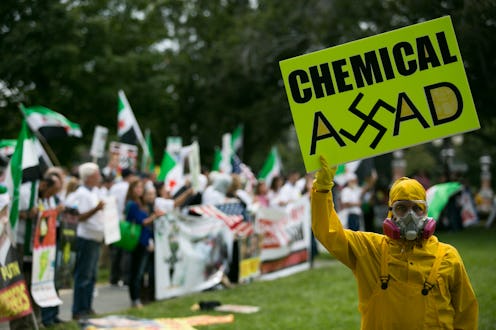News
UN Report: Chemical Weapons Used In Syria
In the first "purely scientific and politically neutral" assessment, UN chemical weapons inspectors reported finding "clear and convincing evidence" Monday that rockets armed with the banned chemical nerve agent sarin were used in the attack in an eastern Damascus suburb on August 21 that killed hundreds.
The 38-page report marks the first official confirmation by scientific experts that chemical weapons were used in the Syrian civil war. The inspectors' full report will be released later Monday. According to the cover letter, "environmental, chemical and medical samples [the inspectors] have collected provide clear and convincing evidence that surface-to-surface rockets containing the nerve agent sarin were used…in the Ghouta area of Damascus."
The cover letter doesn't state whether the sarin was used by the Syrian government or by rebel groups. The inspectors were not required to identifying the party responsible for using the sarin attack, only to confirm whether or not the chemical was used. The cover letter reached the conclusion that "chemical weapons have been used in the ongoing conflict between the parties in the Syrian Arab Republic, also against civilians, including children, on a relatively large scale."
Both the government and opposition groups are known to possess sarin, but it isn't known if rebel groups possess the rockets that deployed the nerve as.
The inspectors visited the Damascus suburbs where the attack took place in August and left the country 10 days later on August 31 with significant amounts of evidence that chemical weapons were used.
In addition to the evidence of sarin-contaminated areas at the inspected sites, the report contains interviews with more than 50 survivors and health care workers, as well as clear signs of exposure in patients and survivors including blood and urine samples that were "found positive for sarin and sarin signatures."
The symptoms included "shortness of breath, eye irritation, excessive salivation, convulsions, confusion/disorientation and miosis," constriction of the pupils.
The Obama administration has threatened unilateral military action against Syria to prevent further use of chemical weapons, and continues to do so. However, in response to mounting international opposition and resistance to the idea of increased military involvement in the Middle East from both the public and Congress, the White House has moved away from military intervention and toward negotiation.
In that vein, Secretary of State John Kerry and Russian foreign minister Sergey Lavrov agreed on a plan over the weekend to remove Syria's chemical weapons in the next year. Hopefully, the UN's findings won't distract from this important effort.
